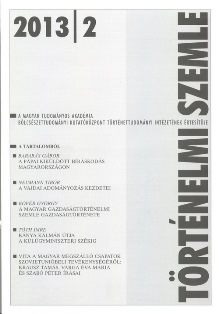A Magyar Gazdaságtörténelmi Szemle (1894–1906) gazdaságtörténete. Intézményi megközelítés és historiográfia
The Economic History of the Hungarian Review of Economic History (1894–1906): an Institutional Approach and Historiography
Author(s): György KövérSubject(s): History
Published by: Magyar Tudományos Akadémia Bölcsészettudományi Kutatóközpont Történettudományi Intézet
Summary/Abstract: The Hungarian Review of Economic History was founded in 1894 as the second economic history journal in Europe. It survived for twelve years. Although a historiographical study has already been devoted to it, the Departments of Manuscripts in the Library of the Hungarian Academy of Sciences and in the Hungarian National Library respectively contain several hitherto unexplored sources (diaries, correspondences), with the help of which the history of the Review can be recast in new light. In a period when economic history had still no university chair, the Review (and a book series which also remained in torso) offerred the only institutional forum for all those dealing with the profession. The editors-in-chief, Károly Tagányi and Ferenc Kováts, struggled throughout with two basic difficulties: those of establishing a sound fi nancial background (recruiting supporters and subscribers), and of raising a stock of devoted authors who would provide studies of the required quality. The main supporters were the Ministry of Agriculture from the governmental sphere, the National Agricultural Association, the Hungarian Academy of Sciences and the Society of Economics. The authors were recruited chiefly from archivists, teachers in secondary schools or in academies of law, and clerics (theological teachers, parish priests). Alongside the institutional framework of the Review’s activity (that is, the economic history of the Review), the study also examines in detail the informal network of personal relations which connected editors, sponsors and authors to each other. Friendships and antipathies, intrigues and personal offences were as integral parts of the Review’s life as royalties and printing bills, and are consequently of the same importance for historiography. The causes which led to the Review’s suppression in 1906, and the respective roles played in them by institutional factors and personal and group conflicts, are made the object of a separate part of this study.
Journal: Történelmi Szemle
- Issue Year: 2013
- Issue No: 02
- Page Range: 201-224
- Page Count: 24
- Language: Hungarian

